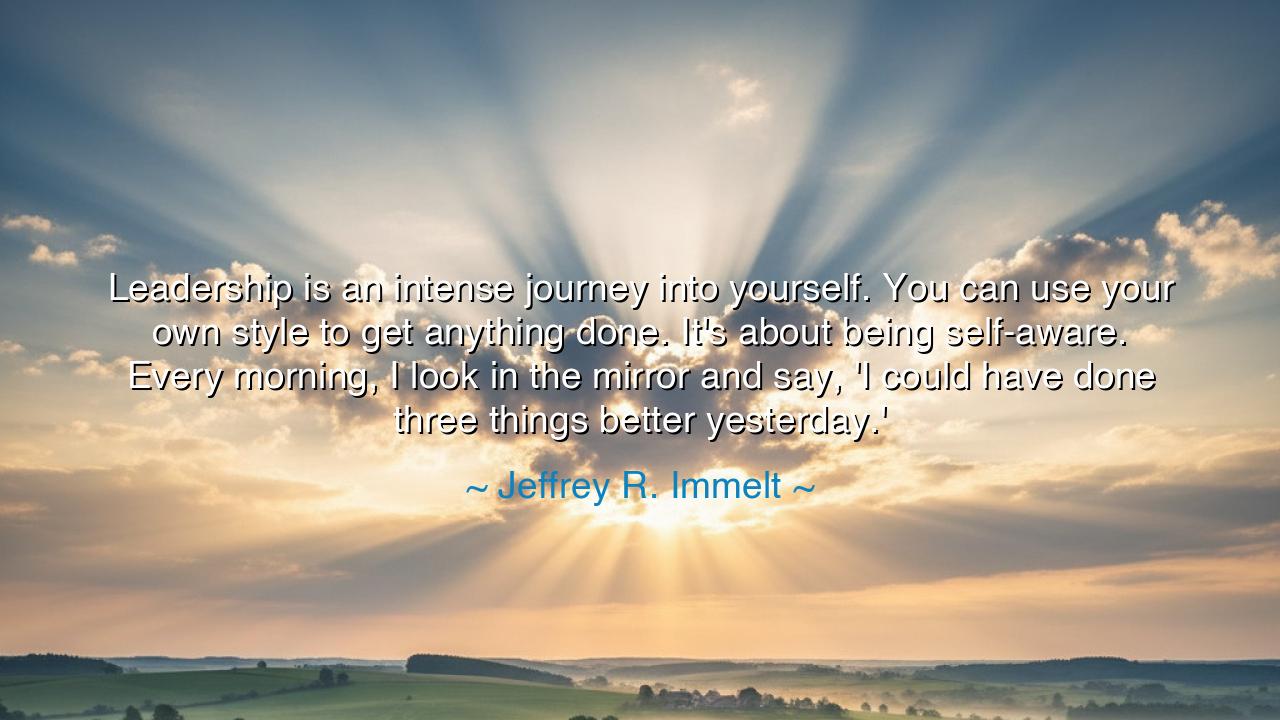
Leadership is an intense journey into yourself. You can use your
Leadership is an intense journey into yourself. You can use your own style to get anything done. It's about being self-aware. Every morning, I look in the mirror and say, 'I could have done three things better yesterday.'






Hear, O seekers of wisdom and builders of destiny, the words of Jeffrey R. Immelt, a leader who bore the weight of one of the world’s greatest enterprises upon his shoulders: “Leadership is an intense journey into yourself. You can use your own style to get anything done. It's about being self-aware. Every morning, I look in the mirror and say, ‘I could have done three things better yesterday.’” In this reflection lies the essence of true mastery — that leadership is not first the conquest of others, but the conquest of self. It is an inward pilgrimage, a relentless refining of the soul, where the greatest battles are fought not on fields of war or in boardrooms, but within the silent chambers of one’s own heart.
Immelt, who succeeded the legendary Jack Welch as CEO of General Electric, spoke these words from the crucible of experience. He led through times of turbulence and change — the bursting of bubbles, the fall of towers, the storms of markets and morale. In those years, he learned that leadership was not a title to be worn, but a mirror to be faced. For every decision, every word, every failure reflected back upon him, demanding not pride but introspection. He knew that to guide others rightly, a leader must first know himself — his motives, his fears, his strengths, and his flaws. Without self-awareness, power becomes blind, and leadership becomes tyranny disguised as confidence.
The ancients, too, spoke of this sacred truth. The oracle at Delphi bore the inscription, “Know thyself.” This was not mere counsel for philosophers — it was the foundation of all wisdom. For he who knows himself cannot be easily corrupted by vanity, nor deceived by flattery, nor destroyed by failure. The leader who understands his weaknesses transforms them into vigilance; the one who sees his pride tempers it into humility. Just as a captain must understand his vessel before setting sail, so must a leader understand the vessel of his own soul before he dares to lead others upon the stormy seas of purpose.
Consider the story of Marcus Aurelius, the philosopher-emperor of Rome. Surrounded by power, adoration, and temptation, he turned each night to his journal — his Meditations — to question himself: “Have I done justice? Have I acted with kindness? Have I lived according to reason?” He ruled an empire, yet his true empire was within — the empire of discipline, clarity, and conscience. He sought not perfection, but progress, as Immelt does when he looks into the mirror and asks, “What could I have done better?” Such daily humility is the mark of true leadership, for it keeps the spirit awake, the ego in check, and the heart aligned with the higher good.
To be self-aware is to walk the narrow path between confidence and arrogance, between doubt and despair. It is to see clearly both the light and the shadow within oneself. Many who rise to leadership are undone not by their enemies, but by the parts of themselves they refuse to face. The wise, however, turn inward daily, polishing the mirror of the soul so that it may reflect truth. Each mistake becomes a teacher, each success a test of character. In this way, leadership becomes not a destination, but a journey — an endless apprenticeship in the art of self-mastery.
And yet, Immelt reminds us that though each leader’s journey is inward, their expression must be uniquely outward. “You can use your own style to get anything done,” he says. This is the power of authenticity. No two leaders are alike, for each is shaped by their own trials and gifts. The imitator leads with borrowed voice; the authentic leader leads with his own. The world does not need replicas of greatness — it needs souls who dare to lead as themselves, in truth and transparency. Such authenticity inspires trust, and trust is the foundation upon which all leadership stands.
Therefore, O listeners and students of the eternal craft, take this teaching to heart: leadership is not found in commanding others, but in mastering oneself. Begin each day as Immelt does — not with pride in what you have achieved, but with humility for what remains to be done. Look into the mirror not to admire, but to learn. Ask, “What could I have done better? Whom could I have lifted higher? What truth did I ignore?” In these questions lies the fire of growth. For self-awareness is not a burden but a light, guiding you through doubt and darkness toward the horizon of wisdom.
And so, remember this eternal law: The greatest leaders are not those who boast of perfection, but those who practice reflection. They fall, but rise wiser. They stumble, but walk truer. Each morning, they begin anew — not seeking power, but purpose; not seeking glory, but grace. Be such a one. Lead not from pride, but from presence; not from fear, but from understanding. For when you master yourself, the world will follow not because it must, but because it will trust in the radiance of your example.






AAdministratorAdministrator
Welcome, honored guests. Please leave a comment, we will respond soon